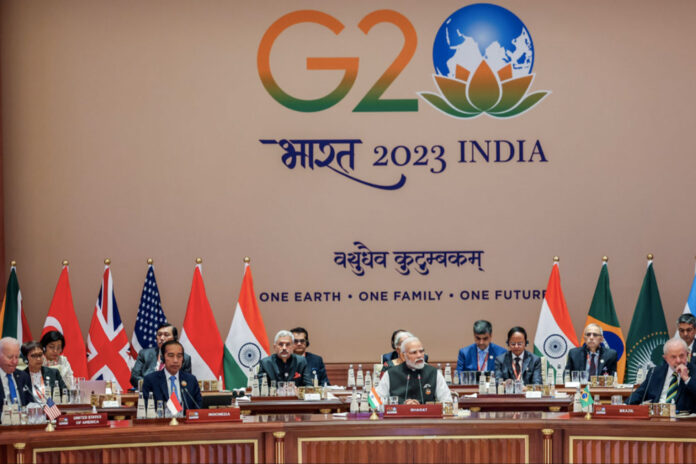The recently concluded G20 Summit proved to be a resounding success for India, leaving no room for doubt. India took centre stage and delivered an impressive performance, showcasing its diplomatic finesse on the world stage. The Summit resulted in a consensus driven communique, the announcement of a massive connectivity project spanning different continents, and the warm inclusion of the African Union (AU) as a new G20 Member.
The overarching message to those attempting to establish an alternative global order is clear: patience is required. The G20, representing a diverse group of both affluent and emerging economies, can collaborate effectively when necessary and heed valuable lessons when confronted with global challenges. This unity was particularly evident in the face of looming international issues, notably the Belt and Road Initiative. India introduced the India-West Asia-Europe corridor, albeit belatedly, underscoring its regional influence.
The G20 summit was not only a diplomatic success but also a masterfully orchestrated event. Diplomatic encounters were choreographed with precision, exemplified by Joe Biden’s interactions with Sheikh Hasina and Justin Trudeau’s understated presence. While some guests received the famous Narendra Modi embrace, others received a more formal greeting. In essence, India proved its ability to bridge East and West, North and South, and, most importantly, to solve global challenges.
Throughout the Summit, the interests of the “Global South” took precedence. Discussions encompassed reforms in multilateral banking systems, increased lending capacity, fairer trade practices, food security prioritization, climate change mitigation, and debt restructuring. Despite China’s obstructionist behavior over the preceding months, attempting to undermine India’s presidency, the G20 remained focused on addressing global crises. China’s objections, ranging from venue preferences to cultural references, stemmed from a zero-sum mentality that sought to protect its perceived civilizational power. In the fractured new world order, cooperation among nations is vital to address crises such as inflation, debt burdens, and food shortages. The Ukraine conflict exacerbated these challenges, prompting some Western nations to reevaluate their approach. While certain Western actors prioritize punitive measures against Russia, others recognize the need to avoid further alienating the developing world. India’s Foreign Minister S. Jaishankar’s sensitization efforts played a pivotal role in this shift.
The West and Japan actively supported India’s presidency to prevent China from capitalizing on India’s failure. The G7 scaled back its demand to explicitly condemn Russia, allowing for consensus-building. Strong criticism of Russia’s actions in the Bali declaration was replaced with a commitment to “territorial integrity and sovereignty” and the pursuit of a “comprehensive, just and durable peace in Ukraine,” a significant development for nations affected by the conflict.
One of the most far-reaching announcements from the summit was the proposal for the India-West Asia-Europe economic corridor, a comprehensive project linking continents and oceans through rail, shipping, and fiber optic cables. This corridor could facilitate the movement of goods from Indian ports to the UAE, railheads in Saudi Arabia and Jordan, and on to Europe, contingent on peace agreements between Israel and Saudi Arabia. The national security advisers of India, the United States, and the UAE played key roles in developing this innovative concept.
Another notable achievement was the acceptance of the concept of digital public infrastructure (DPI), which can deliver cost-effective services using open-source software. Numerous other diplomatic successes are concealed within the 83-paragraph summit declaration.
Furthermore, the bilateral meeting between Narendra Modi and Joe Biden resulted in a substantive joint statement, building on previous announcements made just eight weeks prior. Key outcomes of their meeting included progress on the GE-HAL jet engine deal, negotiations for a commercial agreement, a second Master Ship Repair Agreement, resolution of the final WTO dispute between the two nations, and collaboration in space exploration and semiconductor development.
Biden’s visit to India also spurred action on Capitol Hill, with lawmakers introducing a bill to ease restrictions on high-performance computer and software sales, promoting greater cooperation with India to address shared geopolitical and security challenges.
In closing, Xi Jinping’s absence from the summit was not a snub to India but a self-inflicted setback for Chi- na. A superpower cannot be built on narrow-mindedness, especially when soft power deficits are apparent on a massive scale. India’s successful G20 presidency exemplified the importance of collaboration and diplomacy in a rapidly evolving world.










